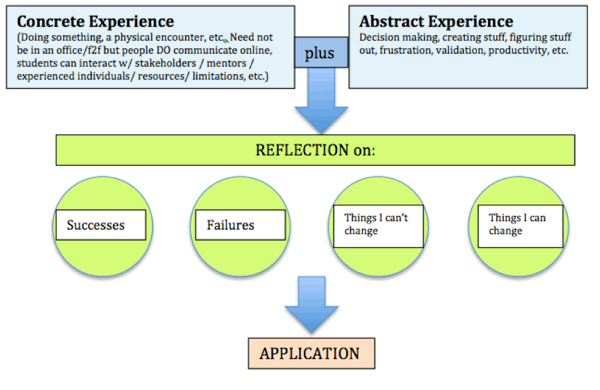The following are excerpts from a paper I’ve been writing with my colleague Anne Hammer at the Northeastern College of Professional Studies (CPS).
Experiential education is a holistic philosophy with carefully chosen experiences supported by reflection, critical analysis and syntheses. In more simplistic terms, experiences are structured to require the learner to take initiative, make decisions and be accountable for the results. This is done through active inquiry, investigation, experimentation, problem solving, assuming responsibility, demonstrating creativity, constructing meaning and integrating previously developed knowledge.
Many colleges, including Northeastern University, offer co-ops and experience in the real world, meaning students get real jobs where they apply what they’re learning in school directly to the workplace.
In some situations, like those of post-traditional graduate students who already have jobs, families and other time-consuming commitments, this kind of workplace immersion is challenging to organize and may be unfeasible. Given that challenge, we’ve been looking at ways students can gain that invaluable online experiential learning (OEL) experience while they’re taking a fully online course.
(For details, see our post on CPS’ new online experiential learning pilot project, which is pushing the concept forward.)
An optimal experiential learning environment is one in which students are engaged intellectually, emotionally, socially, politically, spiritually and physically in an uncertain environment—one where decision-making and risk-taking result in success or failure, which then provide opportunities for reflection. My initiative in fixing copy machines is legend around these parts—borne of experiential learning!
Learning usually involves interaction: between learners, learner and educator, and learner and environment. It challenges the learner to explore issues of values, relationship, diversity, inclusion and community. The educator’s primary roles include selecting suitable experiences, posing problems, setting boundaries, supporting learners, insuring physical and emotional safety, facilitating the learning process, guiding reflection and providing the necessary information. Concrete learning plus abstract thinking is key: If I can fix the copy machine, then the coffee maker exploding is unlikely to faze me.
The following diagram represents the development of successful experiential experiences. It looks a little dry and academic, but when printed out it makes a lovely drinks coaster.

As we consider the transition of courses and curricula from the face-to-face traditional campus to hybrid and online markets, we have to consider how well “experiential” can become online experiential learning and what we need to bring about to make it a focused concept.
In order to review the effectiveness of OEL, we reviewed the literature, interviewed colleagues at schools with reputations for “experiential” and developed a tool to critically assess current online courses. As we put together recommendations for Northeastern’s foray into OEL, we focused on the design and delivery components of OEL.
Experiential Matrix
In an attempt to quantify a course’s “Experiential Value” (EV), rating we developed a set of questions assessed by independent advisors using a 1-5 Likert scale. While our review illustrated inherent strengths of the model as currently implemented, it also indicated areas where we can improve.
The assessment criteria were:
Contextual:
1) Are the materials appropriate/suited to the context of the course?
2) Is the main task and its outcomes aligned with stated course objectives?
Participative:
3) Does the student play an active, rather than a passive part in the task or problem?
Holistic:
4) Does the activity involve a cognitive dimension?
5) Does the activity involve interpersonal and other non-cognitive skills?
Interactive:
6) Does the student interact with other students (applied experiential)?
7) Does the student interact with client(s) or other outside entities?
Realistic:
8) What is the degree of authenticity? (real-world or real-world-like interaction)
9) Is there a propensity for adversity, glitches or other real-world-like unexpected events?
Reflective:
10) Does the experience require abstraction or reflection on the experience: successes and failures?
11) Is there a discussion or other activity involving stimulating questions pertaining to the experience?
Adaptive:
12) Is the student encouraged to apply abstractions or non-cognitive skills learned to novel problems?
13) Is the student encouraged to apply new cognitive skills based on the main task to novel problems?
Our analysis proved that online education does have intrinsic advantages on the experiential front given the nature and format of class discussions, including a multitude of varying life experiences and reflections. Now’s not

